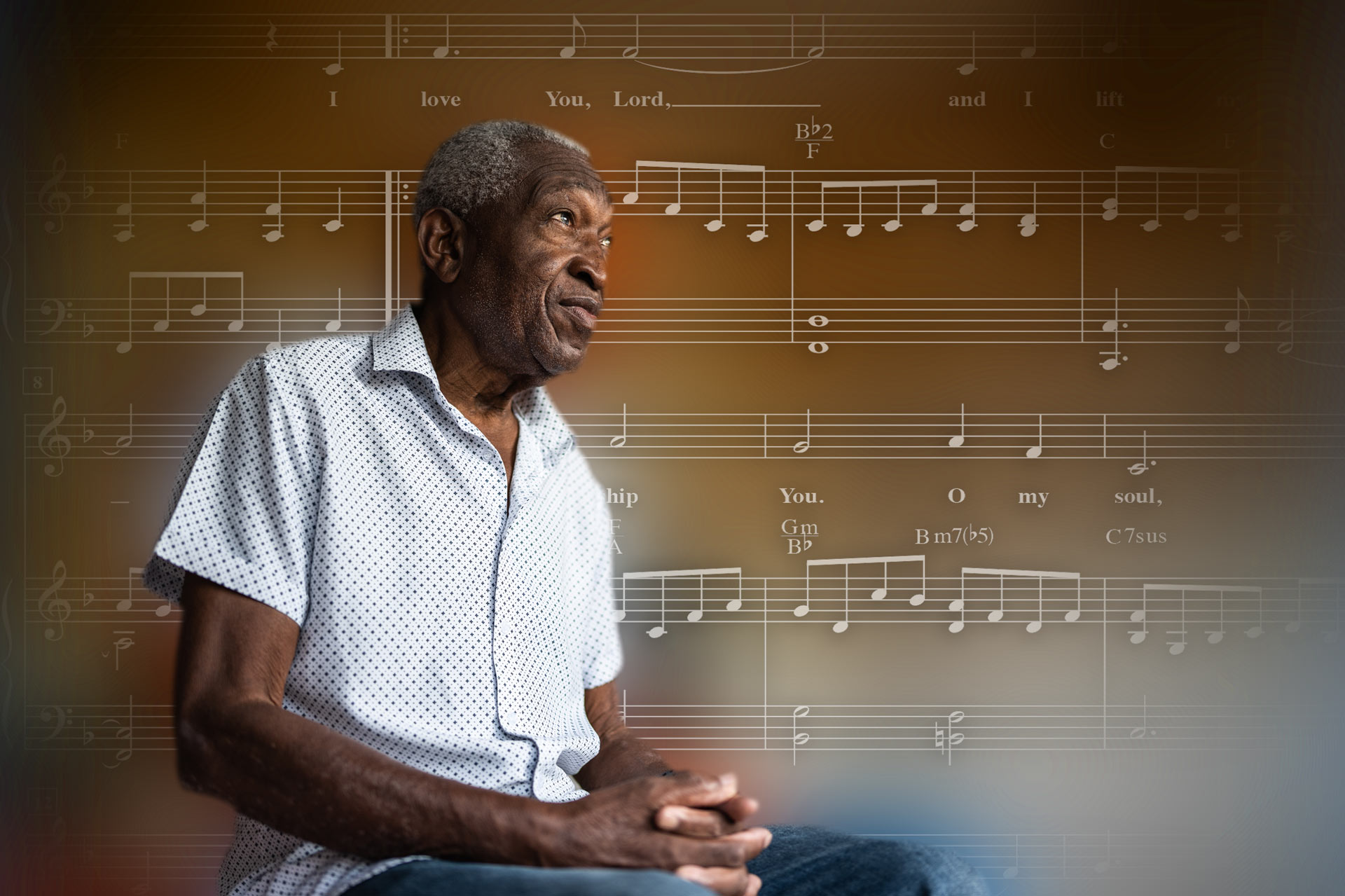Spotlight
Into the Wilderness
Published
1 year agoon

By Michael Hines
This article was taken from a sermon Michael Hines preached at the 2023 National Convention of Open Bible Churches.
In 1678 John Bunyan published the first part of The Pilgrim’s Progress, an allegory of the Christian journey that Bunyan began writing while detained in a jail in England for holding church services. The Pilgrim’s Progress is considered one of the most important Christian books of all time. In more than 345 years, it has never been out of print.
Why? Because there is something about a long journey – the landscape you encounter, the fellow travelers you meet, the unexpected twists and turns in the road. It becomes a great leveler. That is why people take six months out of their lives to walk the Appalachian Way or undertake other incredible journeys.
This journey of our lives eventually evens us all out. We encounter different places along the way, the landscape of our pilgrimage, the places where we get stuck, places we miss altogether. All of them shape us. Nothing we accumulate along the way goes with us.
David speaks of it famously in Psalm 23 (ESV):
The Lord is my shepherd; I shall not want. He makes me lie down in green pastures. He leads me beside the still waters. He restores my soul. He leads me in paths of righteousness for his name’s sake.
We’re all here this week hoping for some of those still, restoring waters – the sense of the affirming hand of the Lord nudging us along paths of righteousness, preparing for us a table, allowing our cups to run over with goodness and mercy following us, pursuing us all the days of our life.
I want to address the journey of the past three years, which has been a great leveler for all of us, a time when many of us have longed for the green pastures and still waters of less troubled times.
We have all discovered that sooner or later the landscape of ministry changes, the terrain of our life gets more rugged, more barren. The climate gets more arid, the world more hostile because there’s no way to ascend the hill of the Lord without leaving the easy living of the coastal plain and climbing through the foothills of the Shfela, the Judean hills leading up from the Mediterranean coast to Jerusalem, passing green pastures and the gentle level plains going up into the olive and pine forested hills surrounding Jerusalem. We may think we have arrived, but the Lord continues to call us on because there is no way to pass from the slavery of Egypt into the place of God’s promise without crossing through the wilderness of the “rain shadow” desert.
The Spirit Leads Into the Wilderness
Throughout the Bible it seems the people of God are never far from the wilderness; it seems to be the place God chooses to meet us. Very few of us would choose to go into the desert for refreshment. But if you speak to the tourist guides in Israel, they will tell you that over time the wilderness becomes their favorite place. There one experiences stillness.
The desert fathers discovered this.
As the air becomes drier, God’s voice becomes clearer.
Every year the Feast of Trumpets, Rosh Hashana, signals the end of the long, barren, hot, dry summer months. It is a season of reflection and thanksgiving in preparation for the last and greatest feast of the year, Sukkot, the Feast of Tabernacles. It is during this season that the Jewish people take time to remember their forty-year wilderness journey and God’s provision and protection.
I have led you forty years in the wilderness. Your clothes have not worn out on you, and your sandals have not worn off your feet (Deuteronomy 29:5).
In the wilderness they experienced God’s constant presence teaching them His law, His ways – molding them into a people. He admonished them to recognize His sovereign hand of protection over them.
I don’t know about you, but there were times in this past forty months that the manna felt dry, and I felt like going back to Egypt. The ground was hard, the people angry, and it didn’t matter where you turned. To your congregation you were the Chief Medical Officer, Chief Compliance Officer, Chief Election Officer, and Minister of Racial Mediation. They wanted to know whether to mask or not to mask, whether to take their chances with an experimental manmade vaccine or an experimental manmade virus.
None of us chose this. But the first truth I want you to grasp is that sometimes the Lord leads us into the wilderness. Jesus was led there.
And Jesus, full of the Holy Spirit, returned from the Jordan and was led by the Spirit in the wilderness for forty days, being tempted by the devil. And he ate nothing during those days. And when they were ended, he was hungry (Luke 4:1-2).
Jesus’ first act after being filled with the Holy Spirit was to be led into a hard place, a dry place, a barren place.
David was driven to the wilderness.
O God, you are my God; earnestly I seek you; my soul thirsts for you; my flesh faints for you, as in a dry and weary land where there is no water (Psalm 63:1).
Elijah fled to the wilderness.
But he himself went a day’s journey into the wilderness and came and sat down under a broom tree. And he asked that he might die, saying, “It is enough; now, O Lord, take away my life, for I am no better than my fathers” (1 Kings 19:4).
Having just faced down King Ahab and the prophets of Baal on Mount Carmel, an act of incredible boldness, and having called the nation to repentance, Elijah now found himself running for his life from Queen Jezebel. The angel of the Lord came to him saying, “Arise and eat, for the journey is too great for you” (verse 7).
Today we see that same spirit of intimidation rising all around us, threatening us, isolating us, hounding us. Do you feel it? Has the journey become too hard for you?
The prophet Daniel saw it probably clearer than anyone in a terrifying vision of the end times, symbolized by a dreadful beast.
He shall speak words against the Most High, and shall wear out the saints of the Most High, and shall think to change the times and the law; and they shall be given into his hand for a time, times, and half a time (Daniel 7:25).
This was a different kind of kingdom – devouring, trampling, speaking words against the Most High, wearing out God’s people; that is, until the kingdom and dominion and power is given to the saints of the Most High. The revelation is told three times in three different ways, but it says the same thing. Trouble is coming. But those who know their God will do exploits, and they will overcome.
What does that mean? It is fixed. It is part of the unchangeable purpose of God. It is imminent. We are in these days.
Power is being consolidated; war is being readied against the saints of the Most High. Those who are not facing it directly are being worn out by a force and a power we don’t understand. Like Elijah, we are tempted to run, abandon our calling, give up.
The Spirit leads you into the wilderness to be tested, to experience the heat of refining, to walk into your calling, to prepare you for days that are yet to come, to learn how to worship. And it is amid wilderness that you find refreshment.
If the last forty months have felt like forty years, if you’ve been circling, wandering, without experiencing immediate fruit and you are not feeling God’s presence, know that it is in your desert place that He wants to speak with you, to draw away with you and remind you that your shoes have not worn out, the manna has not run dry. If you’d look up, you’d see rivers of living water flowing out of the rocks because the Spirit who leads you into the wilderness is able to sustain you there.
The Spirit Sustains Us in the Wilderness
The Spirit sustained Jesus supernaturally. He was “with the wild animals, and the angels were ministering to him” (Mark 1:13). The Spirit also sustains practically. He led the Israelites with a cloud by day and a pillar of fire by night. He provided manna for them and water from the rock. He sustains spiritually through the Word of God. At Mount Sinai, he had a message for the people:
And you shall remember the whole way that the Lord your God has led you these forty years in the wilderness, that he might humble you, testing you to know what was in your heart, whether you would keep his commandments or not. And he humbled you and let you hunger and fed you with manna, which you did not know, nor did your fathers know, that he might make you know that man does not live by bread alone, but man lives by every word that comes from the mouth of the Lord. Your clothing did not wear out on you and your foot did not swell these forty years (Deuteronomy 8:2-4).
The wilderness humbles you and tests you to know what is in your heart. It teaches you that man does not live by bread alone.
The “tabernacles” or “booths” used during the Feast of Tabernacles reminded the people of the tents they lived in in the desert. Made from flimsy branches of trees, the tents left the people fairly exposed to the elements. We all need this lesson on the character of God because we are prone to wander.
Trust comes from knowing God’s character. It was God who provided for the people in the wilderness. He was also able to provide in the land of promise. This teaches us to not limit Him.
God called out in Isaiah 55:1,
Come, everyone who thirsts, come to the waters; and he who has not money, come, buy and eat!” In the New Testament we find Jesus saying, “If anyone thirsts, let him come to me and drink” (John 7:37).
Jesus made this offer during the last day of the festival, after there had been little to no rain for six months. When you come out of a long, hard, barren summer season, the Feast of Tabernacles is a reminder that God is faithful. He who led the Israelites through the desert will lead you into His promises. Even though there are giants in the land to which He is leading you, do not limit Him. Do not withdraw from Him because of the giants in your life. Press in, rejoice. And out of your life will flow “rivers of living water” sustaining you and others.
The Lord will be seen in the wilderness.
The wilderness and the dry land shall be glad; the desert shall rejoice and blossom like the crocus. . . . . They shall see the glory of the Lord, the majesty of our God (Isaiah 35:1-2).
The Spirit Transforms Us In the Wilderness
And when Elijah heard it, he wrapped his face in his cloak and went out and stood at the entrance of the cave. And behold, there came a voice to him and said, “What are you doing here, Elijah?” (1 Kings 19:13).
God waits till we get to the end of ourselves and meets us by His Spirit. Elijah heard the still, small voice at Mount Horeb, a place of surrender. And the Lord changed him there.
When God transforms us in the wilderness, weak hands are strengthened, anxious hearts are calmed, blind eyes are opened, deaf ears are unstopped, and sorrow and sighing shall flee away (Isaiah 35:3-10). Jesus was filled with the Spirit at the Jordan (Luke 4:14), led by the Spirit into the wilderness, and returned to Galilee in the power of the Spirit (Luke 4:16-21).
For waters break forth in the wilderness, and streams in the desert; the burning sand shall become a pool, and the thirsty ground springs of water (Isaiah 35:6-7).
The wilderness gets hot. We get weary. We get tired. Let’s face it, the manna gets old. We get bored. We long for the next, new shiny promise, but we must wander a little longer because the Spirit has led us into the wilderness – sometimes forty days, sometimes forty months, sometimes forty years. It gets wearisome.
We believe God and trust Him for that land of promise ahead. But right now, we are in a dry place – led either by the Spirit, like Jesus, driven by circumstances, like David, or simply finding ourselves there in despair, like Elijah. Know that the Spirit who takes you to the wilderness will meet you there, transforming your heart, attuning your ear, and teaching you that man does not live by bread alone. You cannot learn it anywhere else.
Are you finding yourself in a wilderness season with little inspiration or direction in a dry and weary land with no water? Come to Jesus. He wants to refresh you with the kind of refreshment you can find only in His presence when your soul thirsts for Him.
Remember not the former things, nor consider the things of old. Behold, I am doing a new thing; now it springs forth, do you not perceive it? I will make a way in the wilderness and rivers in the desert (Isaiah 43:18-19).
About the Author

Originally from England, Michael Hines first answered the call to full-time ministry while on honeymoon in Jerusalem in 2002 – at a time when the city was being rocked by a relentless wave of suicide bombings and terrorist attacks. Sensing the call of God to stay in the Middle East, Michael and his new wife, Bonni, spent much of the next decade and a half serving with the International Christian Embassy Jerusalem, living for five years in Israel before relocating to the U.S. in 2007. After many years ministering in churches across the U.S. and leading numerous pastors’ trips to Israel, in 2018 they planted Foundations Church, an Open Bible church in Williamsburg, Virginia, that they still pastor. Their heart is to raise up leaders who can hear the voice of God, minister to the broken, and teach the Bible faithfully. Michael and Bonni have four children, each born in Jerusalem, and currently live in Williamsburg.
You may like

I am Shane Blackledge, and my wife Amber and I are the founding pastors of Cultivate Church in St. Louis, Missouri. My story is one of transformation and God’s grace, showing how He can use anyone to build His kingdom.

I was born in Colorado at the Air Force Academy Hospital. My father served in the Vietnam War, and while stationed in Taiwan, he met my mother and they got married. When I was six, my parents separated, and my mother moved back to Taiwan, leaving me devastated. As a kid, I faced racism and extreme poverty. I battled depression, anxiety, and thoughts of suicide. I started smoking and drinking at eight years old, joined a gang at age thirteen, and was using meth daily by the time I was fourteen.
At age seventeen, I was arrested and sentenced to thirty years in prison for selling drugs. I found myself in my jail cell wanting to end it all. On my night stand I found a Gideon Bible, and I opened it right to John 3:16. As I sat there reading, I realized I was a sinner, but that God created me and I had a purpose to live. I repented and asked Jesus to forgive me. I felt the Father’s love and the presence of the Holy Spirit in an indescribable way.
After my release, I struggled transitioning back into society (finding a job, paying rent, and finding a church that would accept me). I was discouraged and soon relapsed on meth. During the years of my addiction, I was sent to five prisons and was incarcerated for over six years. In 2006, after nearly dying from an overdose, I woke up from a coma and realized God had saved me from death. That day I fully surrendered to Christ, and that’s when my real transformation began.
In 2006, after nearly dying from an overdose, I woke up from a coma and realized God had saved me from death
God restored what addiction had taken from me. I have now been clean from meth for seventeen years. In 2013, I married Amber. We started attending Waverly Life Church, served as youth leaders, and eventually started a Celebrate Recovery program. In 2022, God called us to plant Cultivate Church in St. Louis, Missouri. We resigned from all ministries and jobs and sold our home. In April of 2023, we started house church gatherings which quickly grew in Christ and numbers. We launched our first Sunday gathering in October of 2023.
Today, we are a church without walls, modeled after the early church in Acts. We have regular church gatherings geared towards discipleship, street ministry, addiction recovery, Christian hip-hop events, prison ministry, and nursing home visits. We work with local treatment centers and recovery programs to support and mentor people. We have partnered with churches and ministries to organize monthly inner-city mission trips.
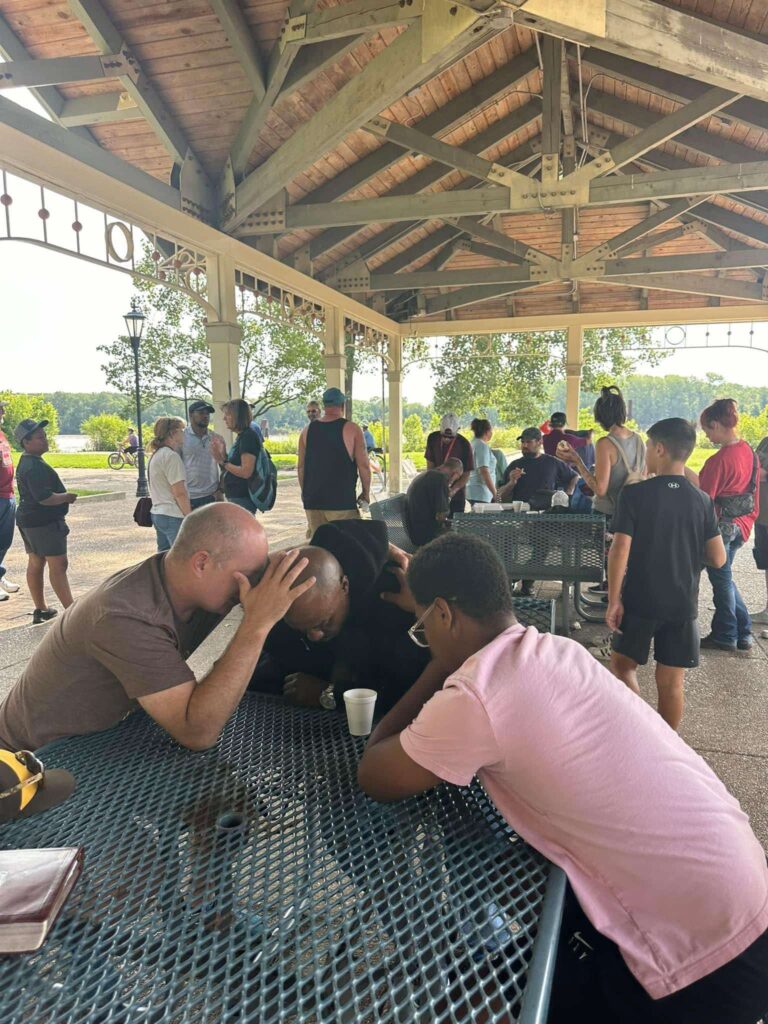
One way God has used my story is with my podcast: “Kingdom Minded,” which streams into 1000 prisons across the country on over one million inmate tablets. In partnership with the Edovo learning app, the podcast focuses on sharing testimonies and teaching Biblical principles.
Looking back, I am amazed at what God has done. In just a year our church has grown from a small group in our living room to a thriving community, passionate about sharing God’s love. Amber and I are excited about the future. We believe God is just getting started with Cultivate Church.
He can use anyone, even a former addict and convict like me, to build His kingdom.
My story and the story of Cultivate Church are really about God’s faithfulness. He can use anyone, even a former addict and convict like me, to build His kingdom. All the glory goes to Him.
To donate toward our prison ministry and homeless outreach, visit wearecultivatechurch.org or check out our Blessing Bags Gift Registry at HERE.
About the Author

Shane R. Blackledge
Shane R. Blackledge is the co-founder and senior pastor of Cultivate Church. He and his wife Amber started Cultivate Church in their home in 2023. Today, the church is known for spreading the Gospel and being the church without walls. Shane’s podcast, “Kingdom Minded,” is available in over 1000 prisons on inmate tablets on the Edovo Learning App. Through testimonies and Bible principles, the podcast aims to teach, inspire, and equip Christians to live their best life now. Shane is an author and speaker, and his books From Prison to Purpose and Overcoming Codependency are available on Amazon. Shane and Amber have four children and live in St. Louis, Missouri.
Spotlight
God’s Greater Plans: From Infertility to Three Babies in One Year
Published
4 months agoon
July 1, 2024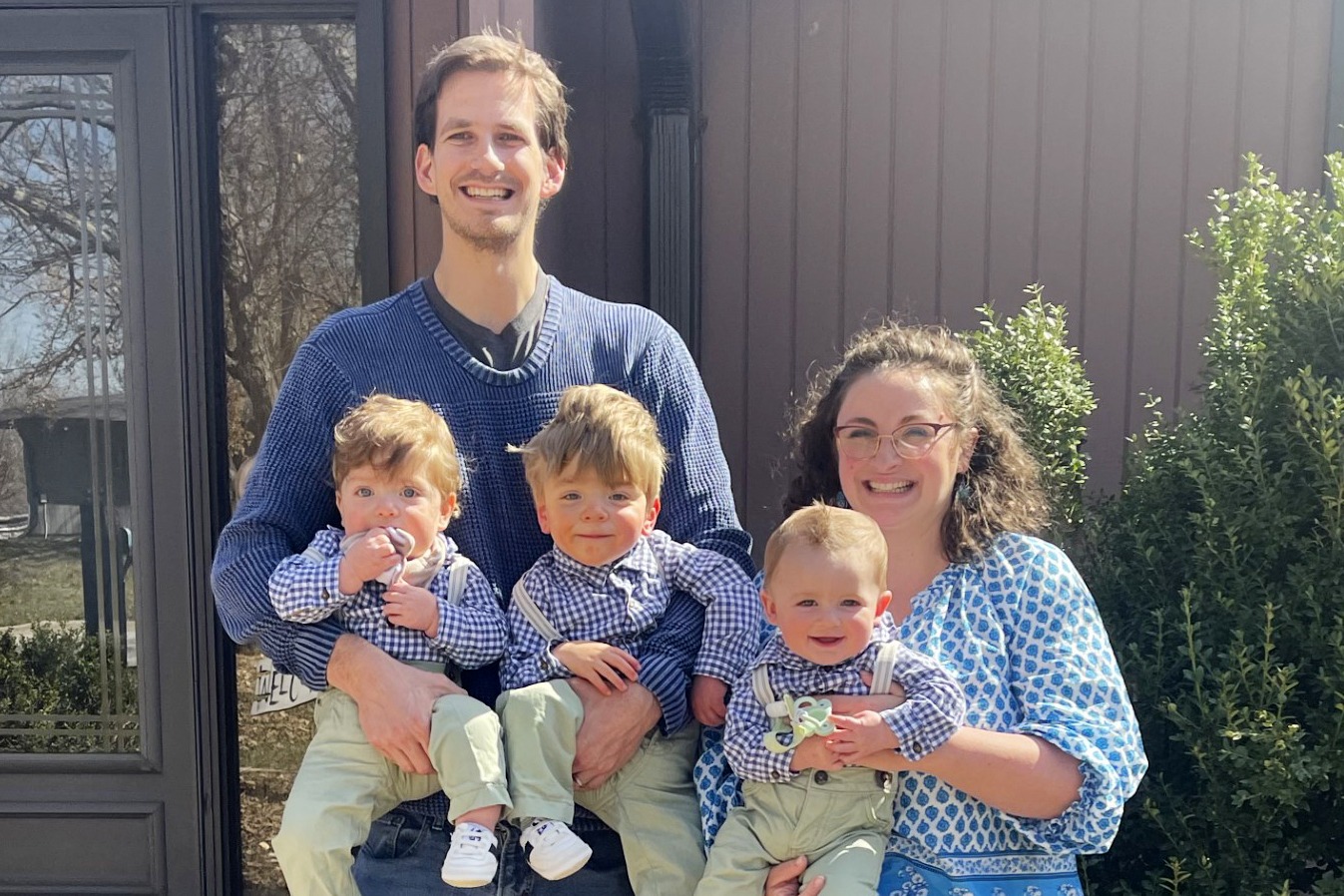
When my husband and I married in July of 2019, it was with a firm understanding of our shared life goals and dreams, and kids were a big part of our plans. In our minds we would have our biological children first, and then when we were ready, we would pursue adoption. But the Lord always has a better plan than ours, doesn’t He?
After we had been married for two years and still had not conceived, we discovered that I was having fertility issues. I saw multiple doctors and was prescribed several medications to help with conception. During this time, I remember telling my husband it felt like we were living in “limbo,” not getting anywhere closer to having a family. Because of our powerful desire to start a family soon, we decided to divert from our original plan and become foster parents.
“Had I conceived when I wanted to…we never would have met Noah and Leif, our precious sons.”
After an entire summer of preparation, our license went active, and we took a couple of short-term placements. These were our first experiences as parents and had us seriously questioning our parenting abilities! But in December of 2022 we got a call about a four-month-old boy named Noah. Noah was in the ICU with significant health concerns. We weren’t given any idea how long he would stay with us or what his life would look like, and we were scared to commit to taking on a placement that held so much uncertainty. After visiting sweet Noah in the hospital and spending considerable time talking and praying about it, we decided we wanted to take this baby and give him a loving, nurturing home — something he had not yet experienced in his short life.
Noah joined our family on December 16, 2022, and immediately, I became remarkably busy caring for him and taking him to all his appointments. We were so busy, in fact, that thinking of my own fertility was put on the back burner; it just wasn’t my priority anymore.
On January 18, 2023, after a routine follow-up for Noah at Blank Children’s Hospital, we got a call from a surgeon informing us that Noah’s brain was bleeding and we needed to rush him to the hospital for emergency brain surgery. The surgery was successful, and I stayed with Noah during his recovery in Iowa City, two hours from our hometown. We were finally discharged and returned home on January 22. During my time in the hospital with Noah, I did not have any of my fertility medications or supplements (but like I said, I wasn’t focusing on that so much anymore).
So many children have endured brokenness and trauma, and they need to be loved. If we as the church do not show them the Father’s love, who will?
Little did I know that the Lord had everything perfectly planned. On February 2, just eleven days after our hospital discharge, I found out I was pregnant. We were overjoyed!
But God wasn’t done surprising us. A few short weeks after discovering my pregnancy, we received word that Noah’s biological mother was pregnant as well, due to have a baby boy in a few months. We knew immediately that if this baby also needed to be placed in foster care, we wanted him to be with his brother, so we told our social worker we would care for him. Noah’s baby brother Leif was born in May, and just five months later, our son, Sven, was born in October. Overall, when we brought Sven home from the hospital, we had Noah (fifteen months), Leif (five months), and Sven (newborn).
In December of 2023, we were able to officially adopt Noah and Leif, ending their days of foster care and guaranteeing them a safe, loving family for a lifetime. It has been a crazy and chaotic year, but I would not trade it for the world. At the time of this writing, their ages are twenty months, ten months, and six months. Our days are filled with exploring new things and reaching new milestones, and our home is brimming with baby gear (think three car seats, three highchairs, a triple stroller…you get the picture).

I honestly believe God planned our entire story. I couldn’t see it at the time of infertility, but had I conceived when I wanted to, we never would have entered foster care, and we never would have met Noah and Leif, our precious sons. Going through this experience has given me so much assurance that God’s timing is always perfect.
If you are in the midst of infertility, I know it can be hard to hear “God has a plan!” But as someone who has seen His perfect plan come to fruition, I encourage you to go to God in prayer. Tell Him your desires, your frustrations, and your hurts, but also consider asking God what He wants from you in this season of waiting. Maybe He has called you to foster, adopt, or minister to the next generation through your church ministries.
Perhaps you haven’t experienced the struggle of infertility, but you do have a heart for the next generation. How might God use you to help disciple and love on kids around you? So many children have endured brokenness and trauma, and they need to be loved. If we as the church do not show them the Father’s love, who will?
About the Author

Natalie Larson
Natalie Larson has been a registered nurse at MercyOne in Des Moines, Iowa, for eleven years, working in both pediatrics and surgery. Her primary role now, however, is being mama to her three active sons. Free time has been hard to come by recently, but when Natalie finds a few moments of it, she enjoys baking, reading, and crocheting. Natalie and her husband, Alex, can be found at Journey Church in Urbandale, Iowa, on any given Sunday, where their boys are some of the most popular congregants.
Spotlight
The Community Table: Portland Open Bible Feeds Bodies and Souls
Published
6 months agoon
May 1, 2024By
Hannah Bemis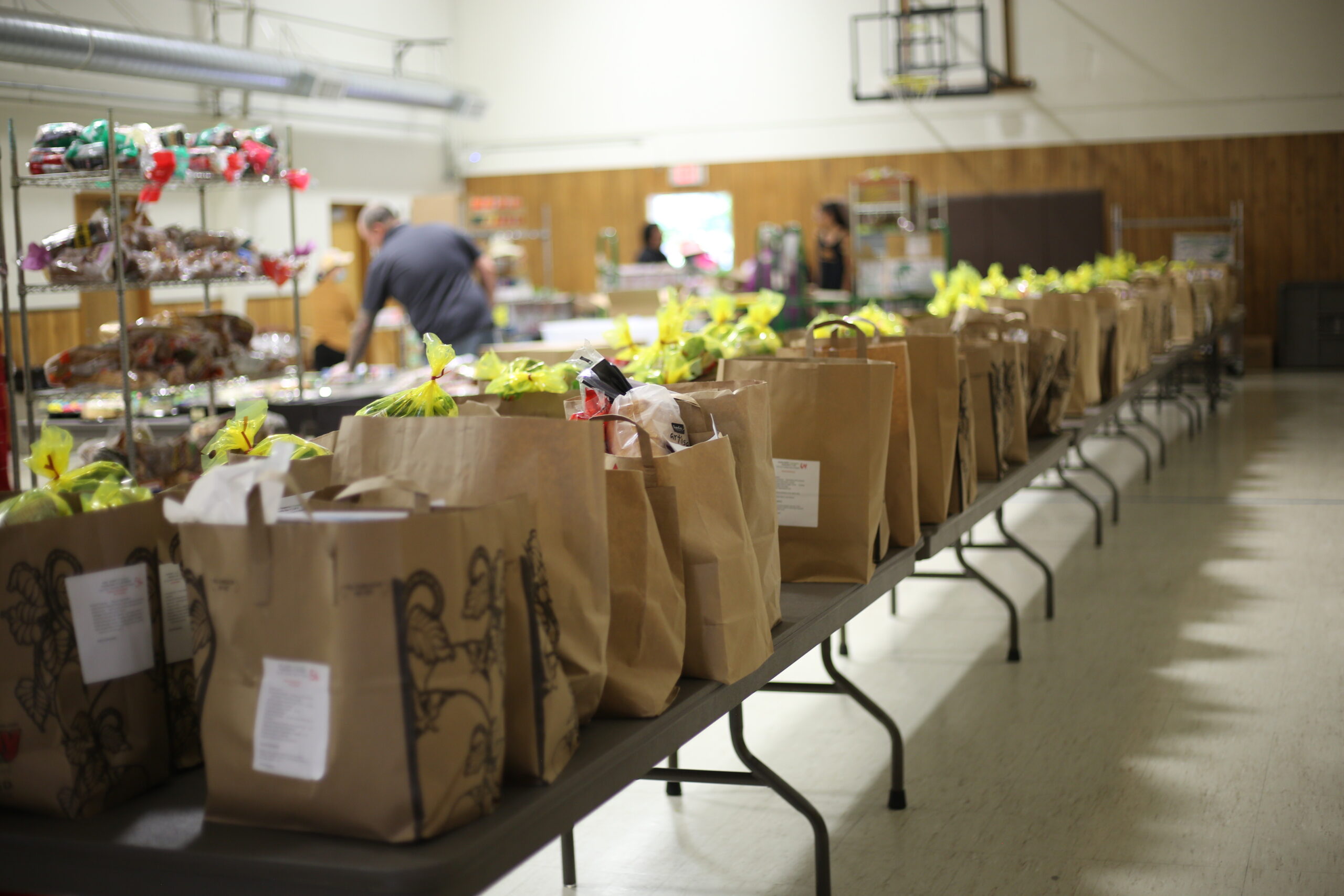
If you walk into the food pantry at Portland Open Bible (POB), you’ll see a beautifully diverse demographic that reflects the neighborhood in which it is planted. Chinese, Russian, African American, Hispanic, and White families all gather on Tuesdays and Thursdays, known in the community as “pantry days.” In addition to receiving food, they’re gifted with joy and a genuine kindness that is unusual for many of them.
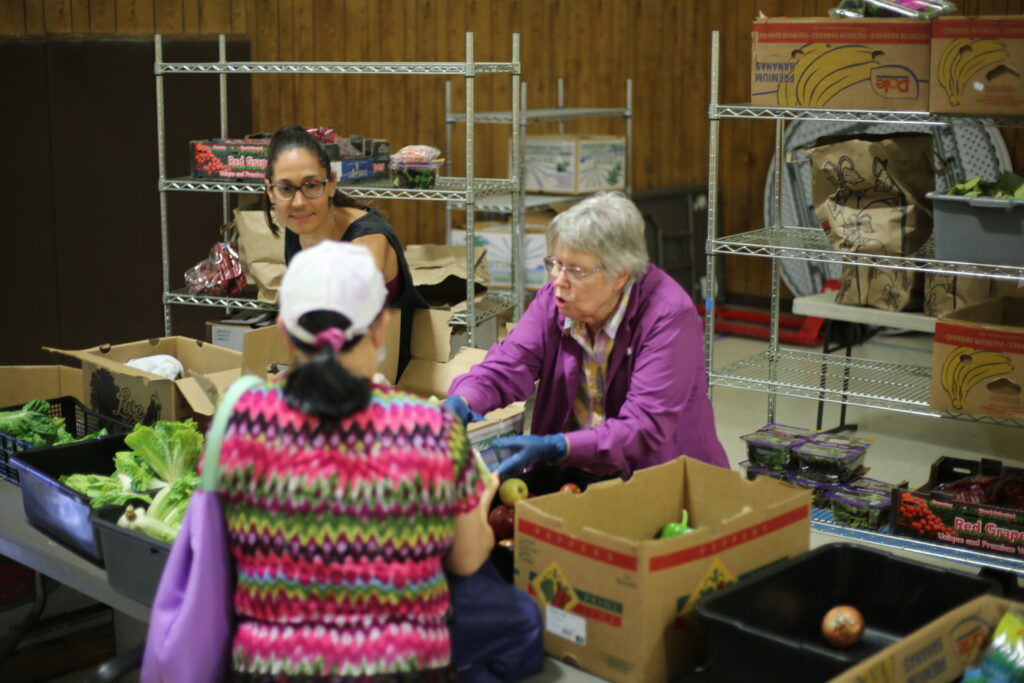
“It offers a level of humanity that they might not have had before,” said Pastor Aaron Brown. “People can say to themselves, ‘If I step on site at Portland Open Bible Church, I know that for one – people are going to be nice to me, and two – they’re going to try and help me with what I need.’”
Aaron and the food pantry team are going a step further, striving not only to give their community what it needs but also what it wants. When the pantry was in its beginning stages, the staff realized that too much of what was given away was being thrown away. They would find food thrown on the ground a short distance from the pantry, and knowing their program couldn’t be sustained with so much food waste, they were determined to solve the problem. As they began taking data on who their program was serving, noting the diverse ethnicities, they realized their food options didn’t meet the dietary needs of many of the ethnicities they were serving.
“We’re putting an end to food waste through client choice.”
“Our Asian families don’t necessarily want Ritz Crackers and Fruit Loops,” explained Aaron. The pantry developed a detailed intake form in which clients were surveyed not only on their demographics and family size, but on the types of food they most desire. This data allows the pantry to save money by purchasing only the food that is needed AND wanted by their community. “We’re putting an end to food waste through client choice.”
That’s not all. As of 2024, the pantry has begun a new program called “The Community Table.” In partnership with Providence health care, the pantry now provides weekly cooking classes with two professional chefs. Each meal is cooked from scratch with whole foods (provided free of charge to participants) and follows a recipe that was contributed by a member of the Portland community. They might cook a Russian meal one week and a Cantonese meal the next. “We have people from all cultures cooking foods from all cultures,” Aaron shared proudly. “It’s food they chose that comes with a story.” Classes are filmed, each recipe taught as a unique episode that includes the recipe’s contributor sharing the story of why that meal is meaningful to his or her family. Once all the episodes are filmed, food pantry visitors will have the option of receiving a video link for a weekly episode along with all the ingredients for that “meal of the week.”
“Everyone deserves to be fed, and to be fed healthy food.”
“I was skeptical at first, but the numbers keep growing,” said Aaron. And he’s not kidding: the pantry has expanded from its initial service of 123 families in 2013 to currently serving 84,000 families.
So, how did it all begin? Aaron credits his mother, Betty Brown, with the idea for the pantry. In 2013 the church was experiencing repeated break-ins. Despite there being technology and other valuables to steal, the only thing taken was food. Betty gathered the staff one day and gave them a choice: “We can either keep reporting these break-ins or we can start feeding our community.” They decided to do the latter. What began with a few donated canned food items by church members developed into what is now a widely recognized program funded by million-dollar grants.

“Everyone deserves to be fed, and to be fed healthy food.” Aaron explained that their neighborhood is in an inner-city “food desert,” a technical term for a neighborhood without easy access to affordable and fresh food. These neighborhoods often have plenty of gas stations and convenience stores, but no grocery stores. Imagine being a single mom who must take city transportation to get to a grocery store in the next city over, then find a way to transport multiple grocery bags home, all with her five kids in tow. This is the reality of many families near Portland Open Bible. The pantry’s intake forms show that these families want healthy options; they’re just in a food desert where they can’t get it.
As Portland Open Bible nourishes its community, they are seeing physical nourishment carry over into the spiritual. “We try to be a beacon of light,” said Aaron. “We serve some of the nicest, friendliest people, and when they see you’ll be kind to them, they open up their whole life story. ‘I used to go to church…’ is what they’ll often say. I’ve seen former youth pastors show up, worship musicians, people high on whatever blasting worship music. They’re usually the most humble people just wanting food.” A lot of them showed up addicted, trying to get clean. They come volunteer at the pantry and get free food, then eventually end up becoming employees. “Overall,” summarized Aaron, “we’re here to bring people to Christ. A lot of people who didn’t go to church before now go to church because of the pantry.”
The pantry has expanded from its initial service of 123 families in 2013 to currently serving 84,000 families.
If you visit 92nd and Powell in Southeast Portland, you just might find a homeless man learning how to make Tiramisu. You’ll also find an innovative church feeding bodies and souls with Christ-like compassion.
“Whoever is kind to the poor lends to the LORD, and he will reward them for what they have done” (Prov. 19:17 NIV).

Volunteers of all ages feed people with a smile 
Sorting fresh produce is one of the many jobs of the pantry staff 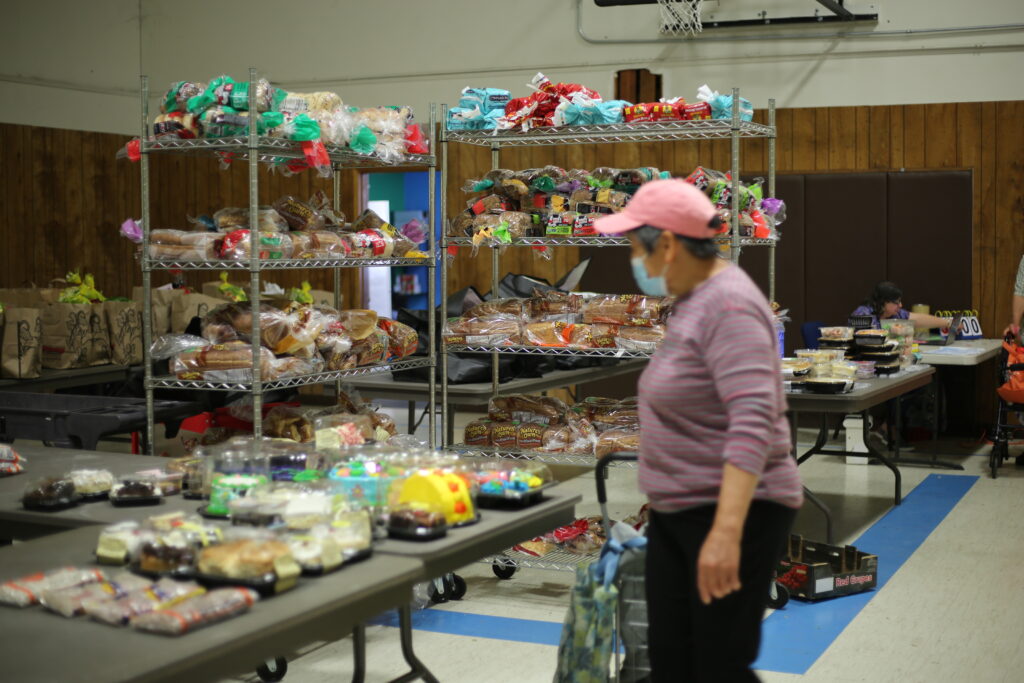
So many choices! 
Selecting the perfect egg 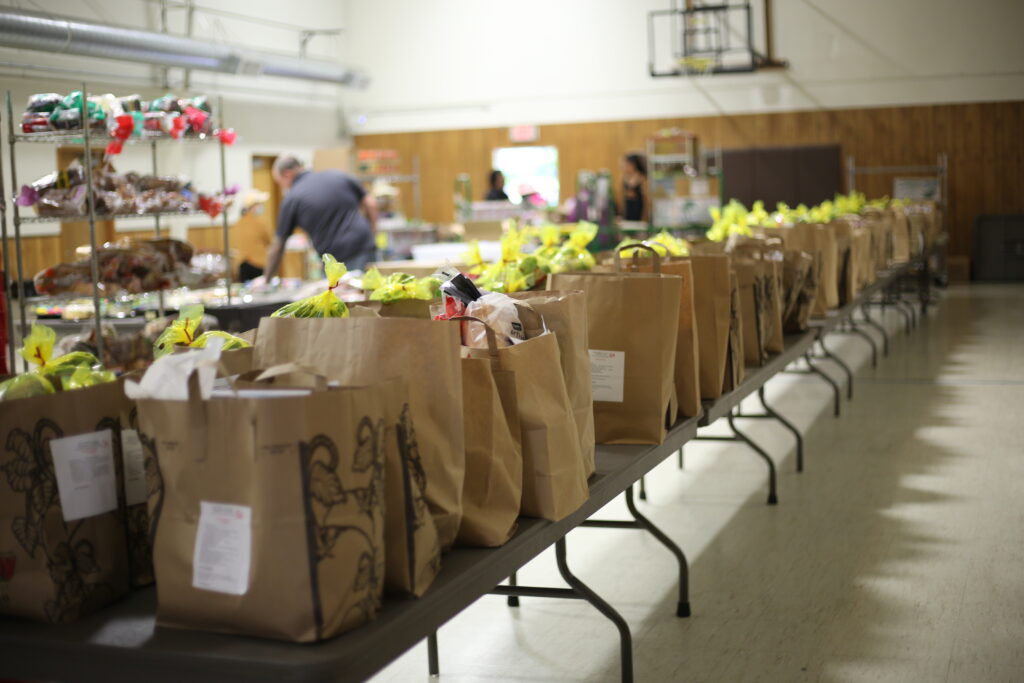
Pre-ordered food bags packed and ready for distribution 
Portland Open Bible Pastor Aaron Brown, with two nieces 
Pantry volunteers joyfully prepare food orders 
Bountiful pantry resources 
Food education (including how to select quality, fresh ingredients) is part of the pantry’s mission 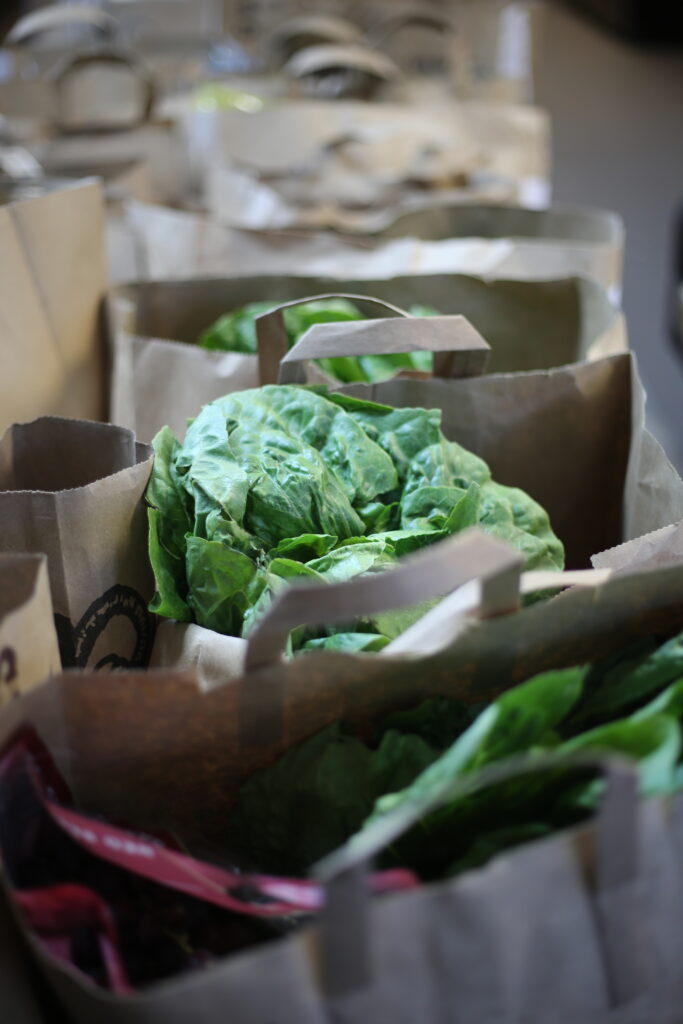
Fresh lettuce! 
Members of the neighborhood check in to receive their weekly food 
Pantry days are a weekly highlight for people of all ages 
Pantry staff hand out fresh produce to members of the neighborhood
To learn more about The Community Table, check out these videos:
About the Author

Hannah Bemis
Hannah Bemis currently serves as the Community Pastor at Turning Point Church in Spokane, Washington. She’s always wanted to do too many things when she grows up, and God has been kind enough to let her do most of them in different seasons. After seasons of mothering, teaching, writing, and staff pastoring, Hannah’s most recent adventures include serving as the Editor and Director of Message of the Open Bible and preparing to plant and co-pastor a church in Newberg, Oregon with her husband, Jordan. After Jesus and all her favorite people, she spends the remainder of her passion on pizza and dark chocolate, in equal measure.




